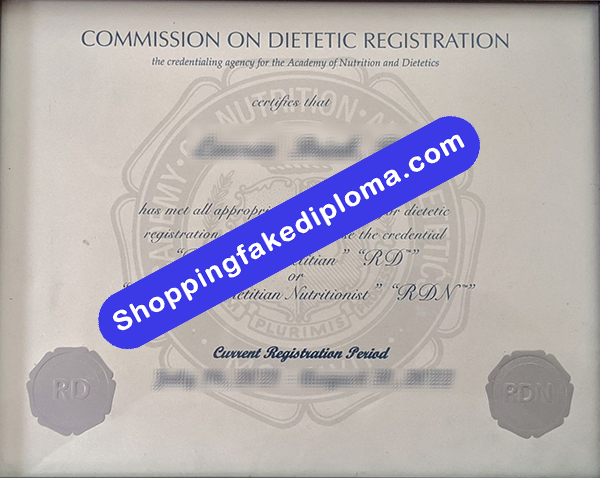Fake Commission On Dietetic Registration Cretificate

Commission On Dietetic Registration Cretificate
You’ve completed your ACEND accredited bachelor’s degree or higher, and your dietetic internship…now you’re ready to clear the last hurdle before legally offering your sage wisdom to clients and helping them walk Get on track with your food life…it’s time to get ready to take the Dietitian Registration Exam, the final step toward earning your Registered Dietitian (RD) credential. Passing this exam is your path to a successful career in nutrition. This is your ticket to national certification from the Commission on Dietary Registration (CDR), the sponsor of the exam. This is the only way you can earn your CDR national credential, a Distinguished Registered Dietitian (RD), also known as a Registered Dietitian Nutritionist (RDN). fake Commission On Dietetic Registration Cretificate, buy fake certificate online, buy fake diplomas online, buy fake degree, buy fake diplomas US.
RD and RDN are just different names for the exact same credentials. CDR allows you to use any of these, so you can tailor your professional title to the population you serve. Passing the nutritionist registration exam now and earning a national RD credential will qualify you for licensure or certification in 45 states. Passing this exam is mandatory in all states that require you to have a national RD credential to be eligible for state-issued licensure or certification. Becoming an RD will help you meet your state’s licensure requirements and earn you a higher salary. As of May 2021, the Bureau of Labor Statistics (BLS) reported that registered dietitians earned an average salary of $65,620, while dietetic technicians earned an average salary of $31,180.
The BLS also revealed that job growth for registered dietitians is projected to outpace that for dietetic technicians in the coming years. Between 2020 and 2030, the number of dietitian jobs is projected to increase by 11 percent, while the number of dietetic technician jobs is projected to increase by 7 percent.
The following bachelor’s and master’s programs offer career-focused instruction delivered by trained nutritionists with experience in the field. Find out more about what each individual course of study offers via the locations below.
Examination Content
Exams are administered on a computer. Each exam is unique and consists of 125-145 random questions from a central database. Therefore, your exam time limit will vary. The exam content assesses four key areas:
Individual and group nutritional wellness – 40%
Evaluation and Screening
assessment and monitoring
Intervention and Planning
diagnosis
Principles of Nutrition – 25%
research application
Communications, Education and Technology
nutritional content of food
food science
Nutrition and related sciences
Management of food and nutrition programs and services – 21%
Quality Management and Improvement
Human Resources
management function
Financial Management
Public Relations and Marketing
Food service systems – 14%
Health and Safety
Facility Planning and Equipment
menu development
Distribution, Service, Production and Purchasing
The 2021 U.S. Bureau of Labor Statistics salary figures and job growth projections for dietitians, nutritionists, and dietetic technicians reflect national data rather than school-specific information. Conditions in your area may vary.